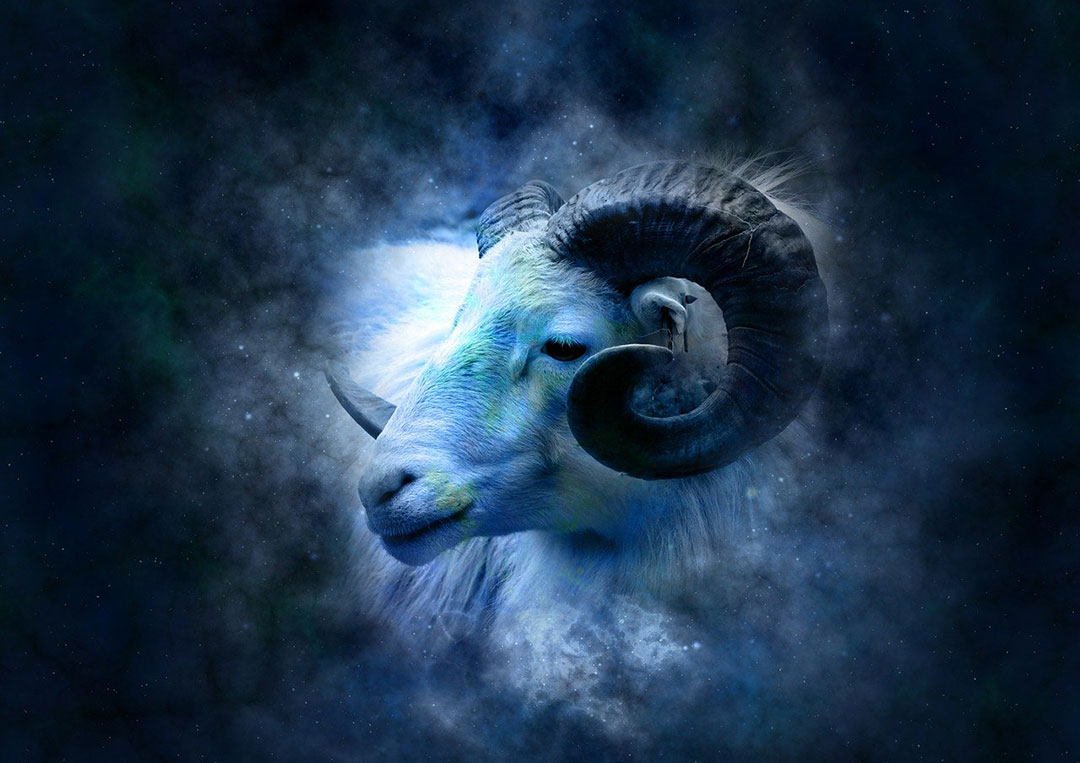
Aries – herald of spring
The moment the Sun enters Aries marks the Spring Equinox. On this day, the forces of light and darkness are perfectly balanced, but from now until the Summer Solstice, the Sun will grow in strength.
Aries is a youthful, potent, and active sign that is not yet fully aware of its own power – which is why it sometimes oversteps the mark.
When Aries reigns, nature awakens from its winter slumber. Tender young shoots, flowers, and leaves cautiously brave the elements. It is a time of vitalizing intrepidness. Thus, Aries signifies new beginnings and the determination to follow one’s calling. The headstrong ram is a fitting symbol.
Ego-glory – or Self-sacrifice
In the religious life of the Ancients, the ram held a special place of honour as a sacrificial animal offered to the gods as an expression of gratitude. From a modern perspective, that does that special honour seems like a pretty rotten lot in life. But to the Ancients, the sacrificial beast was more valuable than gold.
At first, only the firstborn child of the tribal chief was considered worthy enough as a sacrifice. But in time, the practice was altered, and a suitable surrogate was offered instead. That surrogate was usually a powerful ram or a bull in their prime.
Aries is a natural warrior, always ready for a fight. He is full of fire, ready to rescue any maiden in distress or battle the dragons. Aries is gallant, incorrigible and determined to get his way. Aries needs a myth to live by – one that gives meaning to his life’s battles.
Aries Mythology – The Golden Fleece
The most famous Aries myth associated with the sign of Aries is the story of Jason and the Argonauts. The story actually begins much earlier, long before Jason assembled his brave men and set off on his adventure. It started with the twins Phrixus and Helle, born to the half-nymph Nephele and King Athamas of Boeotia.
Unfortunately, their stepmother, Ino, who hated them, plotted to get them killed. But somehow, Hermes got wind of the ill-conceived idea. Alarmed, he devised a cunning plan and sent a sacred ram to the children’s rescue.
The ram took to the sky! He flew to Colchis at break-neck speed. But after he had picked up the children, he raced so fast that poor Helle could not hold on tight enough. She fell off the ram’s back and into the waters below. The narrow strait in which she fell was later named ‘Hellespont’ in her memory and is now known as the Dardanelles.
Phrixus, however, reached Colchis and King Aeetes was good enough to take him in. As a gesture of gratitude, Phrixus sacrificed the ram and gave King Aeetes his Golden Fleece. He accepted the gift and kept it in the cave of Ares, where it was guarded by the watchful eyes of an ‘unsleeping’ dragon.
Jason and the Argonauts
Quite an adventure, you might think. But this is only the preamble of the real Aries Quest, the story of Jason and the Argonauts.
Jason was the son of Aeson, the King of Iolkos, who was overthrown by his half-brother Pelias. Afraid of usurpation, Pelias ordered Jason, who was only an infant at the time, to be killed. Fortunately, Jason’s mother Alcimede managed to hide the child, but she was afraid that eventually, Pelias would find the boy. It was too dangerous for Jason to remain in Iolkos. Thus, with a heavy heart, she sent him away to Mount Pelion in Thessaly, where Jason was to be educated under the tutelage of Chiron, the wisest of the Centaurs.
Years later, Jason returned to Iolcos as a young man to claim the throne. But King Pelias, who had consulted the oracle long ago, expected the challenge. Pelias pretended to concede but demanded Jason should earn his rights to the throne and set him a challenge that Jason could not resist!
The Hero’s Quest
To prove his bravery and courage, Jason was to fetch the Golden Fleece and return it to Iolkos. Of course, Pelias assumed that Jason would never return from this daring adventure. It was an impossible feat and surely the boy would be killed without Pelias having to do the dirty deed.
But without a second thought, Jason accepted the challenge and immediately went off to recruit a crew of brave men willing to join him on this audacious adventure.
Many challenges lay ahead, but this is not the time to tell those tales. Jason very nearly failed altogether had it not been for the aid of the sorceress Medea, who pitied him (or, fancied him?). Her magic guaranteed his success. Jason returned triumphantly, not only with the Golden Fleece, but also with Medea as his wife.
The story is an epic hero tale: the unrecognized champion, who despite being born a noble, must brave great challenges before claiming his rightful place. At the start, a positive outcome for Jason seems impossible, but with the help of a female ally, he eventually succeeds.
Happy End – you might think.
The betrayal
But there is another twist. Drunk with glory and pride, Jason failed to acknowledge those who fought by his side. Medea was furious. Without her, he would never have been victorious! To make matters worse, Jason abandoned her for a younger and more beautiful wife.
Medea did not take kindly to being betrayed and in her rage, she killed their children and left Iolkos.
The lesson that the hero must learn is that no man overcomes great challenges alone. Even a hero needs his allies and supporters. It is not HIS glory alone that matters, but the deed itself. He willingly faced great dangers for the sake of his country and his family. It is his sacrifice, not his glory, that deserves honour.


